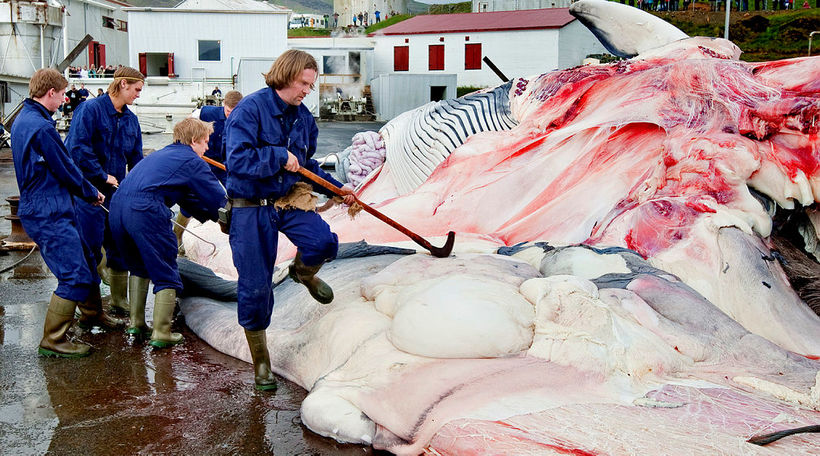Icelandic environmentalist concerned about renewed whaling permit for Fin and Minke Whales
Several environmental and animal rights societies in Iceland have sent an open letter to Parliament expressing their concern about the decision made by Kristján Þór Júlíusson, Minister of Fisheries and Agriculture to renew the whaling permit for Fin whales and Minke whales until 2023.
The letter states:
"Concerning such a controversial topic, we do not understand how this decision could have been taken by what it seems only one minister and based on a report so criticized by professionals, scientists and public opinion. On January 22nd, a group of scientific experts from the Ecological Society of Iceland posted an article to correct the report on the macroeconomic impact of whaling published by the Department of Economics at the University of Iceland, and expressed their opinion that the report was highly biased. They reminded at the same time the roles of whales within the marine ecosystems, as more and more research has been showing in the world. For instance, by diving, migrating, producing large faecal plumes and by dying in the oceans whales are improving primary production and carbon storage. Therefore, they are highly contributing to the fight against climate change.
Climate change is today the biggest threat to the planet and to humanity. For weeks now students have been striking for the climate to ask governments to take immediate action. How is it possible to deliver at the same time a hunting permit against species that help mitigating climate change?
Moreover, Iceland, having signed the Paris Agreement, launched a Climate Action Plan last year that not only fails to include whales but more importantly fails to include marine conservation in general. In January, some of our members attended the seminar “Defending our oceans against the climate threat” at Grand Hotel and again neither whales nor carbon sequestration by oceans (called Blue carbon) were mentioned. We asked the representatives present why those topics were ignored and they replied that they were not aware of them. One of our members, Julie Lasserre, who is a marine biologist sent an email afterwards to the Government to provide scientific references but no one has replied.
On the other hand, we are glad to see that whale watching companies have been working with the City Council of Reykjavik to create and even extend the whale sanctuary. But we do not understand how it is possible for Iceland to protect whales in one area promoting the observation of them alive in the wild, in their natural habitat, and at the same time to kill them in nearby areas? With the success of whale watching in Iceland it is clear that a whale alive is worth more than a dead whale, especially when whale meat is not an Icelandic tradition, but one acquired from Norwegians a few decades ago. Polls have shown that less than 1% of Icelanders eat whale meat on a regular basis and 81% said they had never eaten it. (Source: Gallup 2017) It is not even possible to argue for whale meat consumption for its health benefits since it is highly concentrated in heavy metals and therefore even more difficult to sell abroad.
For all these reasons mentioned, and the obvious corruption and conflict of interest that led to this decision being made, we have decided to protest in front of the Parliament on March 24th at 12:00.
We would also like to take this opportunity to formally ask for a meeting between representatives of the Government and our organizations to discuss these matters, and sincerely hope you will join us and listen to our concerns."
Best regards, Gaia Iceland, Jarðarvinir, Reykjavik Animal Save, Reykjavik Whale Save, Samtök grænkera á Íslandi, Sea Shepherd Iceland, SEEDS Iceland, Stop Whaling in Iceland


/frimg/1/57/93/1579337.jpg)
/frimg/1/57/94/1579405.jpg)




